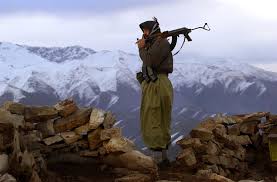The Islamic State: A Perspective

Newsweek recently conducted an interview with a former ISIS member, known by the alias “Sherko Omer”. Omer departed from his native Iraq and entered Syria to fight against Bashir al-Assad’s regime in the civil war. He soon found himself in the violent and ever-changing conflict raging in Syria.
Omer began the interview by providing some background information about himself and his life before joining ISIS. He claimed to be born into a privileged family in Iraqi Kurdistan. His father was a successful businessman, and prior to his departure he was offered a place in the family business. Omer declined the offer because he felt he wanted to help the Syrian people. “It was never my intention to join ISIS,” he insisted.
Omer claimed that his parents were practicing Muslims and prior to his departure, he regularly went to the local mosque for Friday prayers. He never joined any political party or organization, however he had close friends in the Kurdistan Islamic Group. With the help of the KIG, Omer was able to cross the border into Turkey and get smuggled across the Syrian border by KIG contacts. Omer pointed out that he wanted to go fight against a “tyrant” and he was led to believe by the media that the uprising against Bashir al-Assad was nothing other than a valiant revolution. As he quickly came to learn, Syria was in the midst of a sectarian civil war. Omer, at first, was fascinated with joining the Free Syria Army, but he came to the conclusion that they were all “extremist Islamists like Jabhat Al-Nusra and ISIS.”
Unfortunately, when Omer crossed the Turkish border into Syria in October 2013, he ended up in an ISIS border camp with other individuals whom he traveled with. “Others were jihadists who knew what was going on and believed that if they died fighting for Allah they would go to heaven; and there were some who had come to join organizations such as the al-Qaida branch in Syria, the Jabhat Al-Nusra,” he said.
At the very beginning of his captivity, Omer and his companions discussed whether or not they could leave. He described the ISIS militants as nice, and went on to say, “you would never think they would do horrible things as I witnessed later in Al-Raqqa.” Omer witnessed men training for an ISIS suicide squad, as well as an ISIS squad beheading animals. When questioned about the animal beheadings, an ISIS commander stated that is was the “Islamic way of killing Syrian commanders and criminals who raped women and children, and that according to the words of God, this is how those criminal should die.”
Omer claimed that in Al-Raqqa, everyone who publicly spoke out against ISIS was beheaded. There were even instances of ISIS jihadists publicly executing civilians who were thought to be unfit for the Islamic Caliphate or were thought to be guilty of crimes against God. At the start of their journey, Omer and his companions thought it would be a “betrayal” to the members of ISIS who gave them food, clothes, and anything else they needed. They also thought that ISIS was fighting against Assad’s regime so they might as well join them. However, after witnessing what he had in Al-Raqqa, Omer contemplated suicide on multiple occasions.
When Omer was deployed to the Kurdish region, he immediately seized upon the opportunity to join the YPG, or the National Army of Syrian Kurdistan. Omer was briefly held by the YPG, but was soon released after a YPG investigation found him innocent of any real crimes.
During his time in ISIS, Omer was given the job of communications technician. Omer noticed that during his time in the group, most of the field captains and commanders he came across spoke fluent Turkish, and almost never heard them speak in Arabic. He also noted that these commanders he came across openly talked about how the best jihadists had crossed into Syria from Turkey. He also overheard that these foreign jihadists had been stopped by Turkish border police, but because of their ISIS connections, they were soon freed and were allowed to safely cross the border.
Omer recalled his last conversation with one of his two friends who became an ISIS fighter. He claimed that his friend had witnessed ISIS killing innocents and that he had “had enough” of the organization. However, his friend was scared to leave the organization because he had witnessed other deserters being publically beheaded.
After Omer was freed by the YPG, he has tried to distance himself from the memories of his time in ISIS. Omer claims that he has a “constant feeling of guilt and shame that I ended up with this organization in Syria.” He goes on to say, “ISIS is now an inseparable part of my history although I am not and never was an extremist.” Omer now works on an agricultural project owned by his father. He claims that now all he seeks is a “normal life far from war.”
FSA Connection Questions
- In the article, the author is interviewing who?
- In the piece, the word “regime” means what?
- The author seems to offer what main idea?
- Select the best two sentences from the story that support the main idea of Omer never intending to be an ISIS jihadist.
- What is the connotation of the word “tyrant” in the story?
Your donation will support the student journalists of Freedom High School - FL. Your contribution will allow us to purchase equipment and cover our annual website hosting costs.

Hunter Chandler is a 16 year old junior currently attending Freedom High School. Hunter was born on April 5th, 1998 in West Palm Beach, Florida. When he...




